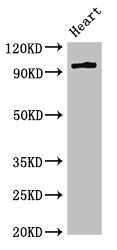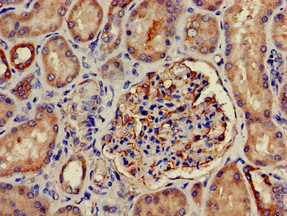Full Product Name
Rabbit anti-Homo sapiens (Human) PRKD3 Polyclonal antibody
Alternative Names
EPK 2 antibody; EPK2 antibody; KPCD3_HUMAN antibody; nPKC nu antibody; nPKC-nu antibody; nPKCnu antibody; nu antibody; PKCnu antibody; PKD 3 antibody; PKD3 antibody; PRK D3 antibody; PRKCN antibody; PRKD 3 antibody; Prkd3 antibody; Protein kinase C antibody; Protein kinase C nu antibody; Protein kinase C nu type antibody; Protein kinase D3 antibody; Protein kinase EPK 2 antibody; Protein kinase EPK2 antibody; Serine threonine protein kinase antibody; Serine/threonine protein kinase D3 antibody; Serine/threonine-protein kinase D3 antibody
Species Reactivity
Human, Rat
Immunogen
Recombinant Human Serine/threonine-protein kinase D3 protein (326-510AA)
Immunogen Species
Homo sapiens (Human)
Conjugate
Non-conjugated
The PRKD3 Antibody (Product code: CSB-PA018713LA01HU) is Non-conjugated. For PRKD3 Antibody with conjugates, please check the following table.
Available Conjugates
| Conjugate |
Product Code |
Product Name |
Application |
| HRP |
CSB-PA018713LB01HU |
PRKD3 Antibody, HRP conjugated |
ELISA |
| FITC |
CSB-PA018713LC01HU |
PRKD3 Antibody, FITC conjugated |
|
| Biotin |
CSB-PA018713LD01HU |
PRKD3 Antibody, Biotin conjugated |
ELISA |
Purification Method
>95%, Protein G purified
Concentration
It differs from different batches. Please contact us to confirm it.
Buffer
Preservative: 0.03% Proclin 300
Constituents: 50% Glycerol, 0.01M PBS, pH 7.4
Tested Applications
ELISA, WB, IHC
Recommended Dilution
| Application |
Recommended Dilution |
| WB |
1:500-1:5000 |
| IHC |
1:20-1:200 |
Storage
Upon receipt, store at -20°C or -80°C. Avoid repeated freeze.
Lead Time
Basically, we can dispatch the products out in 1-3 working days after receiving your orders. Delivery time maybe differs from different purchasing way or location, please kindly consult your local distributors for specific delivery time.
Usage
For Research Use Only. Not for use in diagnostic or therapeutic procedures.








